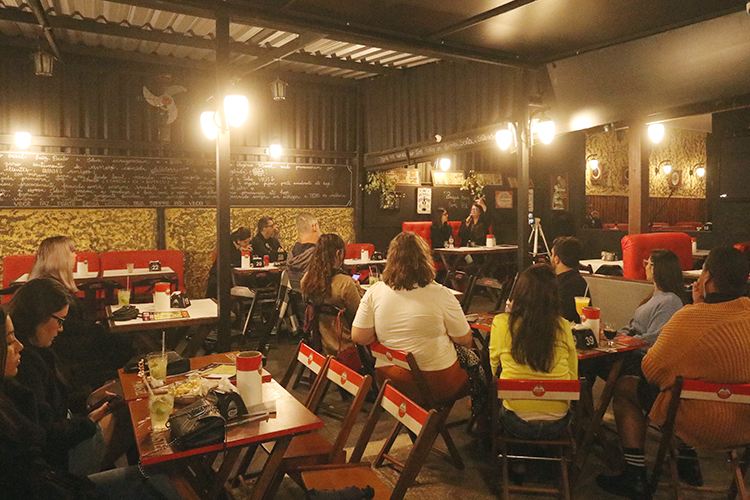Project toast to the flag in the bars of Juiz de Fora
4 min read

Between beer and beer, science gained space in bar counter discussions on November 8 and 9, with the first post-pandemic issue of “Pint of Science,” one of the world’s largest science publishing events, held in bars, restaurants and cafes. UFJF, the city’s event organizer, has, after two years, resumed the culture of taking academic production from various regions outside the university walls in a light and comfortable way. On the night of the eighth of the month, those who were at Bar do Luiz, Bairro Aeroporto, while enjoying some snacks, were able to follow the conversation between UFJF School of Social Work Professor Viviane Pereira, UniAcademia Professor of Psychology and UFJF PhD student, Kíssila Teixeira, on the topic “The Invisible Population: What About Me?”
The journalist from the UFJF Institutional Photo Board Laís Fernandes, who mediated at Bar do Luiz, says the event team has always been interested in making researchers as comfortable as possible. In addition, we establish a dialogue with people who go to the pub to follow the event or, by chance, are there when it happens. I open the microphone for everyone who wants to ask questions and I also leave papers on each table for those who are more shy and prefer to write and send questions to me. Only through this union – taking the researchers to the bar to talk about science and making this conversation possible with the people present – the purpose of “Pint” is achieved. “
Karen Camper, one of the 19-year-old waitresses at the pub, who helped welcome the teachers and the carers, was very happy to work at a place that cares about spreading science. “I think it’s great to bring up discussions like this that we don’t normally hear here.” While attending the audience, Karen said, “If we all have suffered in these four years, imagine the invisible people…”.
Deprivation of poverty
It was raining non-stop on Tuesday, but it didn’t stop guests and other interested parties from coming for a beer and learning about the proposed topic. Kíssila Teixeira brought the concept of invisible people into the debate and then problematized it. “They are those persons who are not in the formal means of producing capital, and of generating value. That is, they, until they work hard, remain in this position of social inequality. However, when these persons are uncomfortable, they are not invisible, perhaps the term The most appropriate is the “naturalized”, because we normalize the issue of inequality to such an extent that we think it is normal for such people to be in that state.”
Vivian Pereira, in turn, put poverty into context, which, according to her, has always existed. However, after the Industrial Revolution, this fact was no longer caused by the scarcity of natural resources. “If before we could not feed the whole population, today we have enough. Poverty, at present, is not the result of scarcity, but of the mode of production, which drives an ever-growing machine out of the population abroad. How many people have attended and were homeless, And as children and teens, they’re covered by City Hall programs. It’s not public policies that will eliminate this problem, but the way we organize ourselves and live.”
Although the solution is complex, researchers recognize that public policies can be a way to mitigate the problem. Vivian is even developing a diagnostic census for the homeless, which is a partnership between the UFJF and City Hall. “We have already collected data and are now organizing this data, which will be central to the production of public policies.”
So far, there are already some projects in town for the invisible people, Kisella noted. Among them are Consultório na Rua, a type of itinerant UBS; Caps AD, a specialized mental health service it serves, although not limited to such residents; hostels or transit homes intended for temporary night shelter; and The Pop Centre, which consists from SUS which is an exclusive social assistance service for the homeless population.”
Gather friends by science
At a table in the bar, a couple of friends went to exchange ideas and watch the teachers conversing. One panelist, Thays Barrera, 28, who works for the UFJF Center for Public Policy and Evaluation of Education (Caed), acknowledges the importance of participating in such events. “Especially at this moment when we’re in a government that’s very skewed toward the individual…it’s good to be able to think about the group and share new experiences.” Her friend Pia Pena, 26, who also works at Caed perfectly agrees, “because being in a bar democratizes academic debate, which is often limited to such a small segment.”
Still at that table of friends was the mathematician José de Paulo, 31, who was very interested in the topic of the meeting, because in his area discussions like those of professors are left aside. “As a teacher, I think about it a lot, even though my reasoning doesn’t focus on social issues. Before knowing the Pythagorean theorem, the Bhaskara formula, and the quadratic function, students need to know that they exist and have a constitution.” Felipe Cardoso, 30, who is also present, agrees. In the circle of friends, this discussion should be in all places and see an increase in disappearance. “They are a forced minority, because in reality they are the majority.”

“Entrepreneur. Music enthusiast. Lifelong communicator. General coffee aficionado. Internet scholar.”

:strip_icc()/s04.video.glbimg.com/x720/11792055.jpg)

:strip_icc()/s03.video.glbimg.com/x720/11786998.jpg)



